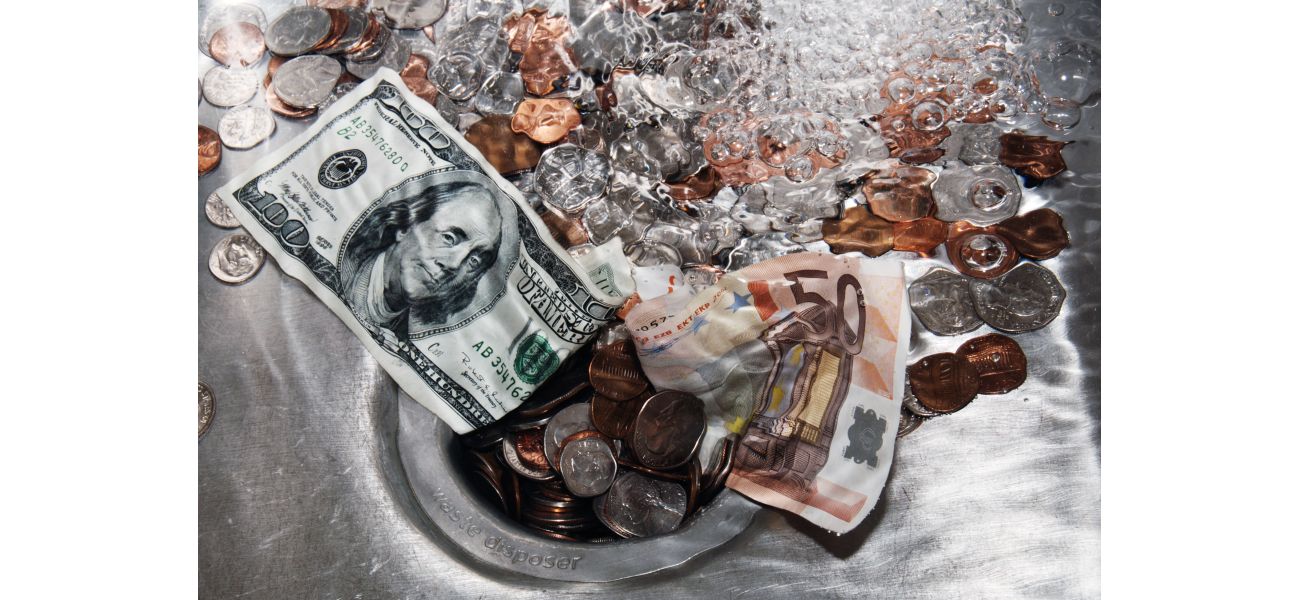Spend your money wisely! Avoid wasting it on unnecessary things, and invest it in things that are worth it.
Spend money wisely; some things are worth it, others aren't.
October 14th 2024.

We've all been guilty of splurging a little too much on things we don't necessarily need. Whether it's treating ourselves to a fancy designer outfit or indulging in holiday feasts, our bank accounts definitely feel the repercussions. However, we also know that it's important to stick to a budget in order to cover our essential expenses such as bills and food. With the cost of living at an all-time high, it's crucial to be mindful of our spending habits. You may think you're being responsible with your money, but you'd be surprised to find out how much you're actually wasting on seemingly small items that add up over time. Let's take a closer look at some of the ways you may be unknowingly throwing your money away and when it's actually worth spending a little extra.
Let's start with something we can all relate to - our daily coffee fix. There's nothing wrong with treating yourself to a pumpkin spice latte or a fancy cappuccino every now and then. But if you're making a habit of picking up a coffee on your way to work every single day or spending more time chatting with your barista than your boss, you may be draining your bank account without even realizing it. That seemingly small amount of £3-£5 per day can add up to a whopping £75-£100 per month, or over £1,000 per year. So instead of making multiple trips to the coffee shop, consider cutting back to just one a day or making your own coffee at home and bringing it to work in a thermos. And who knows, your office may even have free coffee for employees to enjoy.
Another area where we tend to overspend is buying lunch every day. While grabbing a meal deal or meeting a friend for lunch every once in a while is perfectly fine, it's worth considering how much money you could save by bringing your own lunch from home. With the average meal deal costing anywhere from £3-£5 and other sandwich shops charging even more, you could be spending £15-£30 per week or over £100 per month just on lunch. Bringing your own sandwiches from home is a simple and easy way to save money and it's also a healthier option.
We've all been tempted by a good sale, but it's important to be cautious when it comes to buying items we don't really need just because they're on sale. While it may seem like a great deal at the time, you could end up wasting your money on clothes you'll never wear or household items you'll never use. Instead, try waiting 24 hours before making a purchase to see if you still really want or need the item. This will give you time to really think about whether it's a worthwhile purchase or just an impulse buy.
Subscriptions have become a big part of our lives, from streaming services to food and drink subscriptions. But how many of these subscriptions are we actually using? It's easy to sign up for a free trial and then forget to cancel before the paid subscription kicks in, leaving us paying for services we don't even use. It's important to regularly check your bank statements and cancel any subscriptions you're not using in order to save some cash.
And speaking of unused things, how many of us have signed up for a gym membership and never actually used it? If you're one of those people, you're not alone. In fact, 67% of gym memberships go unused, according to USA Today. If you're not using your membership, it's worth canceling to save yourself hundreds of pounds per year. Alternatively, if you do use the gym but are looking to cut costs, consider switching to a cheaper gym without all the fancy amenities. You'll still get a great workout without breaking the bank.
Lastly, let's talk about brand name food. While it may seem like a no-brainer to always go for the big name brands when grocery shopping, it's worth considering if the extra cost is really worth it. Often, store brand items are just as good as the name brands and can save you a significant amount of money in the long run. So next time you're at the store, try swapping out a few name brand items for their cheaper counterparts and see if you even notice a difference. Your wallet will thank you.
We all have those moments where we splurge and spend more money than we should. Whether it's indulging in the holiday season or treating ourselves to a luxury item we've been eyeing, it's easy to overspend and not think about the consequences. However, it's important to remember that our bank accounts won't thank us for it. No one wants to find themselves unable to pay for essential expenses like bills and food. This is why sticking to a budget and avoiding unnecessary spending is crucial, especially with the high cost of living.
You may think that you're responsible with your finances, but you might be surprised to learn how much you're actually wasting on small, seemingly insignificant items. These expenses may seem insignificant at the time, but they can add up over time and have a significant impact on your finances. In this article, we'll explore some of the common ways in which people waste their money and when it's worth paying a little extra for something.
Let's start with a daily indulgence that many of us can't resist - coffee. There's nothing wrong with treating yourself to a fancy cappuccino or a pumpkin spice latte every now and then. However, if you find yourself stopping for a coffee every day on your way to work or spending more time chatting with your barista than your boss, you may be spending a lot more money than you realize. Even if it's just £3-£5 a day, this can add up to £75-£100 per month or over £1,000 per year. Instead, you could try cutting back and only indulging once a day, or even better, making your own coffee at home and bringing it to work in a flask. Your wallet will thank you.
Another common expense that can quickly add up is buying lunch every day. While there's nothing wrong with occasionally grabbing a meal deal or meeting a friend for lunch, constantly buying lunch at work can be costly. With the average meal deal costing between £3-£5 and other sandwich shops charging even more, you could be spending upwards of £15-£30 per week just on lunch. This adds up to over £100 per month. To save money, you could start making your own lunches at home and bringing them to work with you. It's an easy win for your wallet.
Sales can also be a major temptation for many of us. Who can resist a must-have item when it's marked down by 70%? However, there's a risk of buying things we don't really need or will never use just because they're on sale. This could end up being a waste of money instead of a bargain. To avoid this, it's recommended to wait 24 hours before making a purchase during a sale. This gives you time to really consider if it's something you truly want or need.
Subscriptions are another common expense that many people don't fully utilize. From streaming services and news websites to food and drink subscriptions, it's easy to sign up for a free trial and forget to cancel it, resulting in unnecessary monthly payments. To avoid this, it's important to regularly check your bank statements and cancel any subscriptions you no longer use or need. Your bank account will thank you later.
Gym memberships are also a common expense that often goes unused. Many of us sign up with good intentions but end up rarely or never going to the gym. In fact, it's been reported that 67% of gym memberships go unused. If you're in this situation, it may be time to cancel your membership and potentially save hundreds of pounds. Alternatively, if you do use the gym but are looking to save money, consider switching to a cheaper gym. You may not have access to luxury amenities like a sauna, but you'll still get a good workout.
Lastly, let's talk about brand name food. It's tempting to buy name brand products, especially when they're on sale, but often times, the generic or store brand versions are just as good and much cheaper. Don't be fooled by fancy packaging and advertising - try switching to generic brands and see if you can taste a difference. Your wallet will thank you for it.
Let's start with something we can all relate to - our daily coffee fix. There's nothing wrong with treating yourself to a pumpkin spice latte or a fancy cappuccino every now and then. But if you're making a habit of picking up a coffee on your way to work every single day or spending more time chatting with your barista than your boss, you may be draining your bank account without even realizing it. That seemingly small amount of £3-£5 per day can add up to a whopping £75-£100 per month, or over £1,000 per year. So instead of making multiple trips to the coffee shop, consider cutting back to just one a day or making your own coffee at home and bringing it to work in a thermos. And who knows, your office may even have free coffee for employees to enjoy.
Another area where we tend to overspend is buying lunch every day. While grabbing a meal deal or meeting a friend for lunch every once in a while is perfectly fine, it's worth considering how much money you could save by bringing your own lunch from home. With the average meal deal costing anywhere from £3-£5 and other sandwich shops charging even more, you could be spending £15-£30 per week or over £100 per month just on lunch. Bringing your own sandwiches from home is a simple and easy way to save money and it's also a healthier option.
We've all been tempted by a good sale, but it's important to be cautious when it comes to buying items we don't really need just because they're on sale. While it may seem like a great deal at the time, you could end up wasting your money on clothes you'll never wear or household items you'll never use. Instead, try waiting 24 hours before making a purchase to see if you still really want or need the item. This will give you time to really think about whether it's a worthwhile purchase or just an impulse buy.
Subscriptions have become a big part of our lives, from streaming services to food and drink subscriptions. But how many of these subscriptions are we actually using? It's easy to sign up for a free trial and then forget to cancel before the paid subscription kicks in, leaving us paying for services we don't even use. It's important to regularly check your bank statements and cancel any subscriptions you're not using in order to save some cash.
And speaking of unused things, how many of us have signed up for a gym membership and never actually used it? If you're one of those people, you're not alone. In fact, 67% of gym memberships go unused, according to USA Today. If you're not using your membership, it's worth canceling to save yourself hundreds of pounds per year. Alternatively, if you do use the gym but are looking to cut costs, consider switching to a cheaper gym without all the fancy amenities. You'll still get a great workout without breaking the bank.
Lastly, let's talk about brand name food. While it may seem like a no-brainer to always go for the big name brands when grocery shopping, it's worth considering if the extra cost is really worth it. Often, store brand items are just as good as the name brands and can save you a significant amount of money in the long run. So next time you're at the store, try swapping out a few name brand items for their cheaper counterparts and see if you even notice a difference. Your wallet will thank you.
We all have those moments where we splurge and spend more money than we should. Whether it's indulging in the holiday season or treating ourselves to a luxury item we've been eyeing, it's easy to overspend and not think about the consequences. However, it's important to remember that our bank accounts won't thank us for it. No one wants to find themselves unable to pay for essential expenses like bills and food. This is why sticking to a budget and avoiding unnecessary spending is crucial, especially with the high cost of living.
You may think that you're responsible with your finances, but you might be surprised to learn how much you're actually wasting on small, seemingly insignificant items. These expenses may seem insignificant at the time, but they can add up over time and have a significant impact on your finances. In this article, we'll explore some of the common ways in which people waste their money and when it's worth paying a little extra for something.
Let's start with a daily indulgence that many of us can't resist - coffee. There's nothing wrong with treating yourself to a fancy cappuccino or a pumpkin spice latte every now and then. However, if you find yourself stopping for a coffee every day on your way to work or spending more time chatting with your barista than your boss, you may be spending a lot more money than you realize. Even if it's just £3-£5 a day, this can add up to £75-£100 per month or over £1,000 per year. Instead, you could try cutting back and only indulging once a day, or even better, making your own coffee at home and bringing it to work in a flask. Your wallet will thank you.
Another common expense that can quickly add up is buying lunch every day. While there's nothing wrong with occasionally grabbing a meal deal or meeting a friend for lunch, constantly buying lunch at work can be costly. With the average meal deal costing between £3-£5 and other sandwich shops charging even more, you could be spending upwards of £15-£30 per week just on lunch. This adds up to over £100 per month. To save money, you could start making your own lunches at home and bringing them to work with you. It's an easy win for your wallet.
Sales can also be a major temptation for many of us. Who can resist a must-have item when it's marked down by 70%? However, there's a risk of buying things we don't really need or will never use just because they're on sale. This could end up being a waste of money instead of a bargain. To avoid this, it's recommended to wait 24 hours before making a purchase during a sale. This gives you time to really consider if it's something you truly want or need.
Subscriptions are another common expense that many people don't fully utilize. From streaming services and news websites to food and drink subscriptions, it's easy to sign up for a free trial and forget to cancel it, resulting in unnecessary monthly payments. To avoid this, it's important to regularly check your bank statements and cancel any subscriptions you no longer use or need. Your bank account will thank you later.
Gym memberships are also a common expense that often goes unused. Many of us sign up with good intentions but end up rarely or never going to the gym. In fact, it's been reported that 67% of gym memberships go unused. If you're in this situation, it may be time to cancel your membership and potentially save hundreds of pounds. Alternatively, if you do use the gym but are looking to save money, consider switching to a cheaper gym. You may not have access to luxury amenities like a sauna, but you'll still get a good workout.
Lastly, let's talk about brand name food. It's tempting to buy name brand products, especially when they're on sale, but often times, the generic or store brand versions are just as good and much cheaper. Don't be fooled by fancy packaging and advertising - try switching to generic brands and see if you can taste a difference. Your wallet will thank you for it.
[This article has been trending online recently and has been generated with AI. Your feed is customized.]
[Generative AI is experimental.]
0
0
Submit Comment





